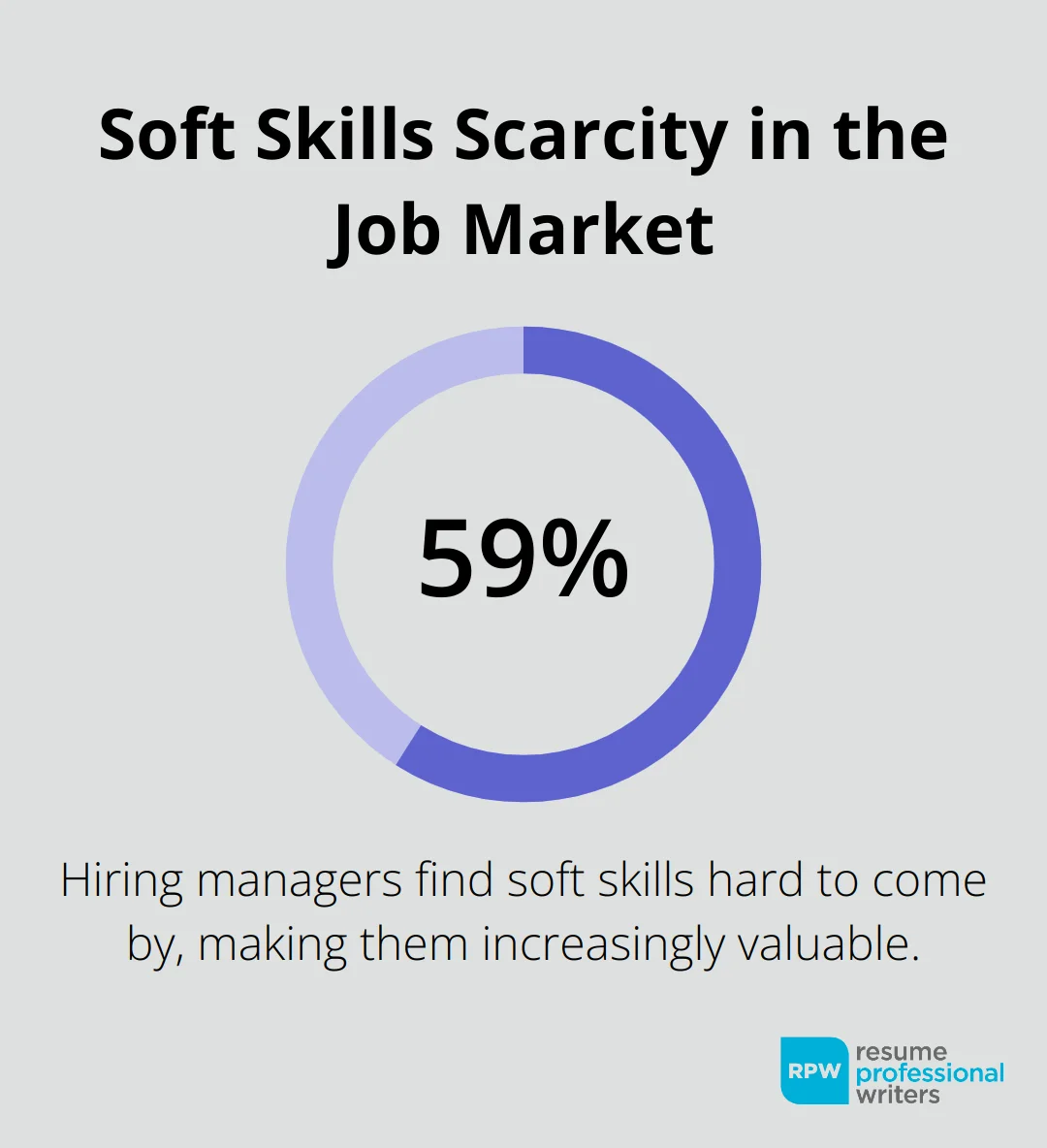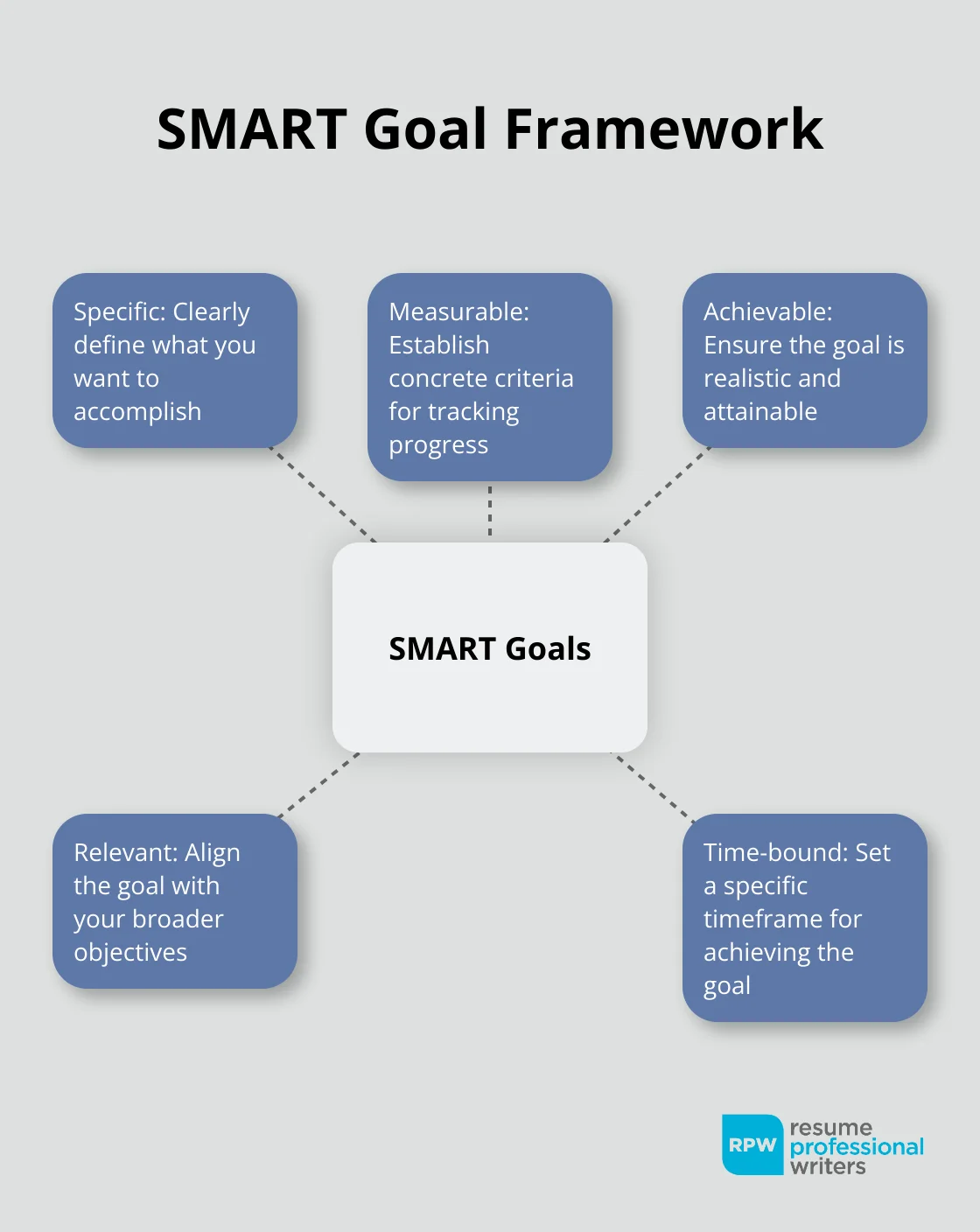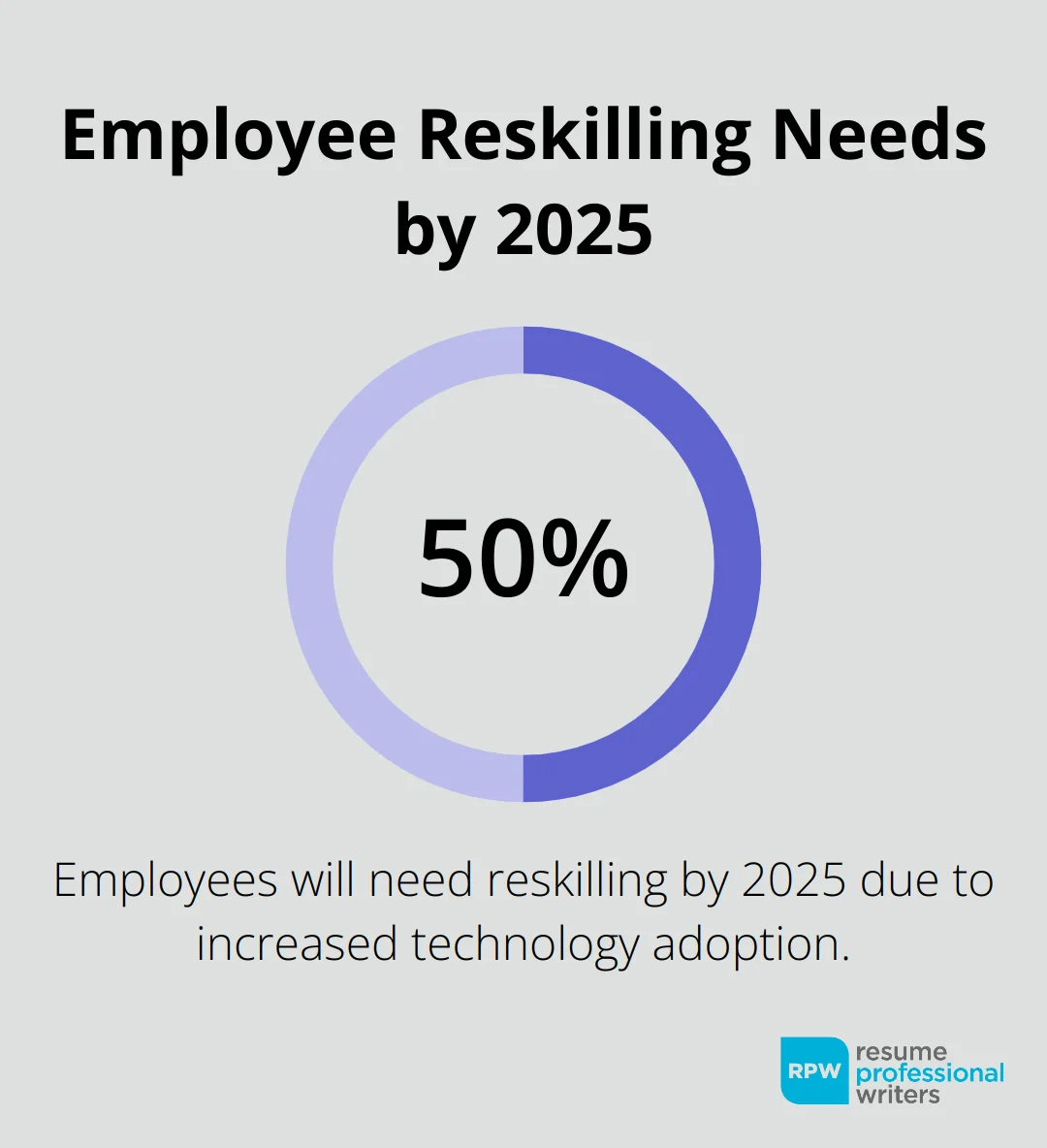Feeling stuck in your job? Craving more purpose or momentum in your professional life? Your career development journey is a continuous process that demands clarity, intention, and action. The next step starts with understanding where you are now and mapping out where you want to go.
In this guide, you’ll learn how to evaluate your current position, set impactful career goals, and implement strategies that fuel long-term success. Get ready to take control of your career development journey and start building the future you want—one intentional step at a time.

Where Do You Stand in Your Career?
Understanding your current position is the first step toward making informed career decisions. Use the prompts below to evaluate where you are now and what might need to change.
Conduct a Skills Inventory
Start your career assessment by creating a comprehensive list of your skills. Include both hard and soft skills, such as technical abilities, industry-specific knowledge, and transferable skills like communication or leadership. A LinkedIn survey reveals that 59% of hiring managers find soft skills hard to come by, which makes them increasingly valuable. Don’t just list your skills; rate your proficiency in each. This self-assessment will spotlight your strengths and uncover areas of expertise for improvement.

Identify Your Career Satisfaction Drivers
Understanding what truly motivates you in your career is essential to shaping a fulfilling career development journey. Do you value financial reward, work-life balance, or the opportunity to make a difference? A Gallup poll found that only 34% of U.S. workers are engaged at work, indicating a widespread lack of job satisfaction. Reflect on your current role: What aspects do you enjoy? What frustrates you? This analysis will help you align your career goals with your personal values and aspirations—an important step toward long-term growth.
Map Your Professional Achievements
Document your professional accomplishments, both big and small. Did you lead a successful project? Improve a process? Save the company money? Quantify these achievements where possible. For example, “Increased department productivity by 15% through implementation of new workflow system.” This exercise not only boosts your confidence but also provides concrete examples of your value to potential employers or for negotiating advancements in your current role.
Analyze Your Industry Position
Take a step back and look at your position within your industry. Are you keeping pace with industry trends? Do you possess the skills that are in high demand? According to the World Economic Forum’s Future of Jobs Report, 50% of all employees will need reskilling by 2025 as adoption of technology increases. Understanding where you stand in relation to these trends can help you identify areas where you need to upskill or pivot.
Evaluate Your Work-Life Integration
In today’s fast-paced work environment, achieving a healthy work-life balance (or integration) is more important than ever. A study by Deloitte found that 77% of employees have experienced burnout at their current job. Assess how well your current role aligns with your personal life goals and values. Does your job allow for the lifestyle you desire? Does it provide opportunities for personal growth alongside professional development? This evaluation can guide you in making decisions about your career development trajectory that align with your overall life satisfaction.
As you complete this comprehensive self-assessment, you’ll gain a clearer picture of your current career situation. This insight forms the foundation for the next crucial step in your career development journey: setting clear and achievable goals. Let’s explore how to translate this self-knowledge into actionable career objectives.
How to Set Career Goals That Matter
Setting meaningful career goals gives your professional journey direction and purpose. Instead of drifting from role to role, you create a clear roadmap that aligns with your aspirations and values. Here’s how to set goals that truly matter—and stick to them.
Bridge the Gap Between Present and Future
Start by envisioning your desired position in five years. A study by Dominican University reveals that individuals who document their goals are 42% more likely to achieve them. Take time to articulate your desired role, responsibilities, and impact. Then, work backwards to identify the necessary steps to reach that vision.
For example, if you aspire to become a marketing director, your path might include gaining experience in digital marketing, developing leadership skills, and obtaining relevant certifications. Each of these becomes a milestone in your career plan.
Craft SMART Career Objectives
SMART goals (Specific, Measurable, Achievable, Relevant, and Time-bound) provide a framework for effective goal-setting. A vague goal like “improve leadership skills” transforms into “Complete a leadership certification program within the next 6 months and lead at least two cross-functional projects by the end of the year.”

Research by the Society for Human Resource Management indicates that employees who use SMART goals are 3 times more likely to achieve them compared to those who don’t. When crafting your goals, be precise about what you want to accomplish, how you’ll measure success, and the timeline for achievement.
Align Professional Growth with Personal Values
Your career development journey should align with your personal values and life aspirations. A survey by Deloitte found that 70% of millennials expect their personal values to be reflected in their workplace culture. As you move forward, consider how your professional objectives fit into your broader career development journey, and ensure they resonate with your core beliefs and lifestyle preferences.
For instance, if work-life balance is a priority, your goals might include finding a role that offers flexible working hours or remote work options. If making a social impact is important to you, you might target positions in non-profit organizations or corporate social responsibility departments.
Adapt Goals to Industry Trends
Stay informed about industry trends and adapt your goals accordingly. The World Economic Forum’s Future of Jobs Report suggests that 50% of all employees will need reskilling by 2025 due to increased technology adoption. Incorporate skill development goals that align with these trends to stay competitive in your field.
Set Milestones and Celebrate Progress
Break down your long-term career goals into smaller, achievable milestones. This approach allows you to track progress and maintain motivation. Celebrate each milestone you reach (no matter how small) to reinforce positive behavior and keep yourself engaged in your career development journey.
As you set these meaningful career goals, the next step is to develop strategies for career advancement. Let’s explore effective ways to put your goals into action and propel your career forward.
How to Accelerate Your Career Growth
Climbing the career ladder doesn’t happen by chance—it takes intentional effort. From building new skills to making smart connections, here are proven strategies to fast-track your professional growth.
Embrace Continuous Learning
In today’s rapidly evolving job market, continuous learning is essential. The World Economic Forum reports that 50% of all employees will need reskilling by 2025. Allocate time each week for professional development. Take online courses, attend webinars, or read industry publications.

Platforms like Coursera and edX offer courses from top universities. Many professionals succeed by dedicating just 5 hours per week to learning. This investment can lead to significant career advancements. A study by Udemy found that 40% of employees who engaged in learning programs received promotions within a year.
Expand Your Professional Network
Your network can catalyze career growth. LinkedIn reports that 85% of jobs are filled through networking. Attend industry events and join professional associations relevant to your field. Try to connect with at least one new professional each week.
Virtual networking has gained prominence. Participate in online forums, contribute to LinkedIn discussions, or join Twitter chats related to your industry. These activities expand your network and position you as a thought leader in your field.
Seek Strategic Mentorship
A mentor can provide invaluable guidance and accelerate your career progression. Research by Olivet Nazarene University shows that 76% of people consider mentors important, yet only 37% have one. Take the initiative to find a mentor within your organization or industry.
When you approach potential mentors, be clear about your goals and what you hope to learn from them. Prepare specific questions and scenarios you’d like to discuss. Mentorship is a two-way street and can play a vital role in your career development journey. Offer value to your mentor as well—perhaps by sharing insights from your own experiences or assisting with tasks they may need help with. Building strong mentor relationships can provide the guidance and support you need as you navigate your path forward.
Take on High-Visibility Projects
Volunteering for challenging projects showcases your skills and gains recognition. A study by Development Dimensions International found that 45% of high-potential employees actively seek out difficult assignments to prove themselves.
When you take on new projects, focus on those that align with your career goals and have a significant impact on your organization. Document your contributions and outcomes. These achievements will boost your confidence and provide concrete examples for future job applications or promotion discussions.
Consider Strategic Lateral Moves
Sometimes, the best way up is sideways. Lateral moves can broaden your skill set and give you a more comprehensive understanding of your industry. According to a study by Gartner, 70% of employees who made a lateral move stayed with their company three years later (compared to 62% of those who were promoted).
Look for opportunities in different departments or even in other companies within your industry. Each new role adds to your versatility and makes you a more valuable asset. When you consider a lateral move, evaluate how it aligns with your long-term career goals and the new skills or experiences it will provide.
Final Thoughts: Navigating Your Career Development Journey Ahead
Taking the next step in your career development requires intention, consistency, and a willingness to grow. In a fast-changing professional world, those who actively shape their path are more likely to find long-term success and fulfillment.
Career growth is a continuous journey marked by both achievements and challenges. While setbacks may occur, they often serve as powerful learning opportunities that build resilience. Celebrate your wins—big or small—and stay committed to your goals. With clarity, action, and persistence, your next career milestone is within reach.

Take Your Career to the Next Level with a Job-Winning Resume
A well-defined career development journey is the foundation of long-term success—but every journey begins with a single, strategic step. That first step is often your resume. A compelling, well-crafted resume doesn’t just summarize your experience; it sets the tone for your entire professional narrative. It opens doors, grabs attention, and positions you as a serious contender in your field. If you’re aiming to elevate your career, your resume needs to reflect not just where you’ve been, but where you’re headed.
At Resume Professional Writers, we specialize in creating job-winning resumes tailored to your goals and industry. Our expert resume writing team combines industry knowledge, keyword optimization, and personalized strategy to craft resumes that stand out to recruiters and applicant tracking systems alike. Whether you’re aiming for a promotion, transitioning careers, or re-entering the workforce, we’re here to help you present your best self on paper—and take your career to the next level with confidence.








